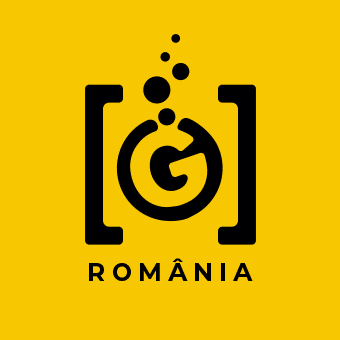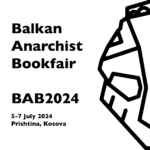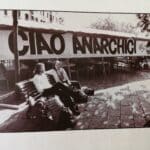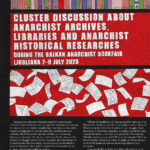We are in a bleak situation. Climate forecasts for the coming decades do not look good at all. Each new study shows that we are close to crossing some irreversible tipping points. Political decision-makers align themselves with the destructive needs of fossil capital, through greenwashing and new exploitation projects. And because we know that in such an environment of uncertainty and fear, the extreme right thrives the best, we try to prepare ourselves to prevent its success at the local level.
In search of some forms of anticipating the discourses of the far right, we held two public debates (1) (and several internal discussions) regarding gas exploitation in Romania’s geography. The struggle for gas control and profits has been at the root of wars, conflicts, coups and occupations throughout history. We know how public opinion is manipulated in the interests of borders and militarization, national security and so-called energy independence. We don’t want to let people believe that the solutions to the climate crisis or energy needs are in the border and national control. But.
The neoliberal context we are living in is fertile ground for fascism. The rush for more gas, “from alternative sources” to Russian gas, is articulated in terms of national security, and any domestic exploitation project (e.g. the Neptun Deep exploitation perimeter in the Black Sea) or gas transport (e.g. Import and export of Azerbaijan’s gas through the BRUA pipeline) are projects of national interest. In this way they arrive on NATO’s agenda too, and so they become militarized projects (protected through war if needed). In this context, political parties like AUR (2) can advance without problems ideas such as: gas exploitation must be done by Romanians for Romanians, OR the re-nationalization of OMV-Petrom is the solution for Romania’s economy and energy, OR re-opening of coal, lignite and uranium mines is necessary etc. Such fossil-fascist ideas are already at play here, but an even bigger danger that might be developing is the usage of “green” or renewable energy and climate solutions for limiting/blocking immigration, strengthening borders and population controls — eco-fascism. AUR has already some discourse around “green” hydrogen as the solution, for example.
Fossil gas is still perceived as a “less polluting” fuel and is often still a symbol of well-being (you have gas in the town, you are more modern). The risk is that, as we succeed in turning the slogan “clean gas is a dirty lie” into an inescapable reality, power will be repositioned in the hands of those who can continue to keep maximum profits despite this reality: through austerity, control, the lead of an iron fist in times of crisis, for the Romanians by Romanians etc.
And so, we see these new exploitative projects, like Neptun Deep, as an opportunity for the homegrown extreme right to grow. But the formation of a local eco-fascist discourse could become an even more serious hindrance or co-optation to the still very fragile and incipient local climate movement. The questions we started our debates were: What kinds of discourses and actions can we embrace in radical circles so as to avoid entanglement with rising nationalism and fascism? And how can we articulate anti-fascism in the fight for climate and environment, especially if the far right will juggle with the subject instead of just denying it?
In Gastivists Collective we were always addressing the fight against fossil gas as an intersection of struggles. The question we put over and over again in our movements is “Is it possible to talk about de-gasification without talking about militarisation?” (3). For those of us living close to projects that have their infrastructure controlled by the military it was an obvious answer (Cyprus, Palestine, Israel, Greece — see EastMed pipeline fight). We faced multiple times the European reality in which people told us “it is difficult to say that your gas creates wars”. But in the context of rising eco-fascism, to us, naming their wars starts to be more necessary than ever before. Without the fight against militarisation, borders and colonialism through extractivism, gas will never stop flowing.
Now, in our romanian geography and maybe in the whole balkan region too, far right actors are still fossil-fuel-oriented, but the anti-gas movements are not so strong either. Through our position, between european needs and eastern/southern realities, we can still decide which borders we want to play at: “the energy frontier of the EU” talking about climate issues only, or the border from which no more of this “import of gas no matter the consequences” is happening ever again.
We are still in the search of how to articulate this in the local context for a wider public, but we want to start by suggesting the necessity we identified:
NAME THEIR WARS.
= the requests of Azerbaijan’s gas imports by the EU through balkan pipelines fueled the Armenian ethnic cleansing of the Nagorno-Karabakh in September 2023. (4)
= the inclusion of EastMed pipeline on the PCI List (projects of common interest) by the European Comission in November 2023 makes EU complicit to the genocide in Palestine through it’s financial support to the Apartheid Regime of Israel.
= the plans of gas exploitation of Neptun Deep by austrian OMV and romanian Romgaz in the Black Sea are implying the militarisation of the area and threatens not only the marine biodiversity and ties the financial future of Romanian geography in this way to the fossil fuel, but threatens the security of the entire region itself.
Footnotes:
1) One in Cluj-Napoca under the name “Why #StopNeptunDeep?”, and one in Bucharest at the Autonomous Zine and Book Fair under the name “Planetary limits and local dynamics: a discussion about the fascist danger and the radical political imaginary in the climate discourse”
2. AUR is the far-right political party in Romania. Their discourse mentioned here is taken from their government program.
3) Check our zine from the Solstice Gathering we held in 2023, pag. 16. These questions were meant to show the different realities in which we fight, but they also show different realities we have to engage with actively, centering them whenever possible, not only acknowledging them from far away.
4) The silence that EU applied to such atrocious event is clearly connected to it’s gas needs https://www.politico.eu/article/eu-sanctions-gas-deal-azerbaijan-grow-ethnic-cleansing-fears-nagorno-karabakh/








